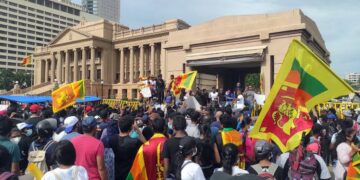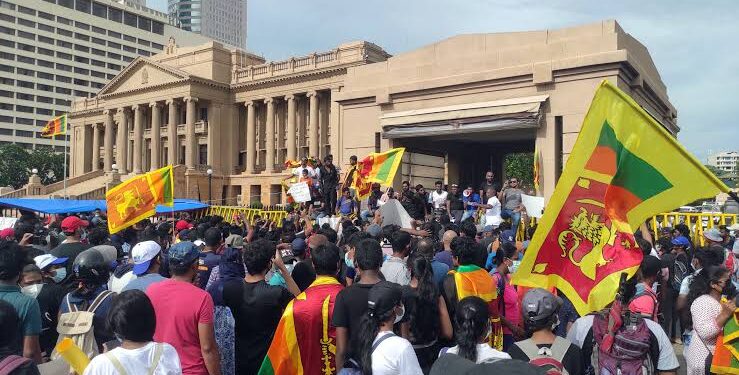By Enyichukwu Enemanna
Sri Lankan protesters have forced their way into the official residence and nearby office of the country’s President, Gotabaya Rajapaksa demanding his resignation following the island nation’s worst economic crisis in recent memory.
Television reports on Saturday said thousands of people demonstrated in the capital.
It was not clear if Rajapaksa was inside the residence in Colombo but footage shot on mobile phones showed a large number of people inside the well-fortified house and on the grounds outside.
A government spokesman, Mohana Samaranayake, said he had no information about whether Rajapaksa had left the residence.
Hundreds of protesters, some carrying national flags, also entered the president’s office in another nearby building, television footage showed. Protesters blame Rajapaksa for the economic woes and had occupied the entrance to his office building for the past three months calling on him to step down.
Video posted on social media showed hundreds of protesters running into the president’s residence, chanting “Gota go home,” calling the president by his nickname. Outside the building, barricades were overturned.
At the president’s office, security personnel tried to stop protesters who passed through the fences and stormed the colonial-era Parliament building, which has been converted into the president’s office.
At least 34 people including two police officers were wounded in scuffles as protesters tried to enter the residence. Two of the injured are in critical condition while others have sustained minor injuries, said an official at the Colombo National Hospital who spoke on condition of anonymity.
Thousands of protesters had entered the capital, Colombo, from the suburbs earlier on Saturday after police lifted an overnight curfew.
Last month, Sri Lanka’s Prime Minister Ranil Wickremesinghe said the country’s economy has collapsed. The government’s negotiations with the International Monetary Fund have been complex because the country is considered a bankrupt state.
In April, Sri Lanka announced it is suspending repaying foreign loans due to a foreign currency shortage. Its total foreign debt amounts to $51 billion of which it must repay $28 billion by the end of 2027.
Police imposed a curfew in Colombo and several other main urban areas on Friday night but withdrew it Saturday morning amid objections by lawyers and opposition politicians who called it illegal.
U.S. Ambassador to Sri Lanka Julie Chung on Friday asked people to protest peacefully and called for the military and police “to grant peaceful protesters the space and security to do so.”
“Chaos & force will not fix the economy or bring the political stability that Sri Lankans need right now,” Chung said in a tweet.
The economic crisis has led to a heavy shortage of essentials like fuel, cooking gas and medicines, forcing people to stand in long lines to buy the limited supplies.
Months of protests have nearly dismantled the Rajapaksa political dynasty that has ruled Sri Lanka for most of the past two decades. One of Rajapaksa’s brothers resigned as prime minister last month, and two other brothers and a nephew quit their Cabinet posts earlier.
President Rajapaksa has held on to power.
He took over as prime minister in May and protests temporarily waned in the hope he could find cash for the country’s urgent needs but people now want him to resign saying he has failed to fulfill his promises.

































